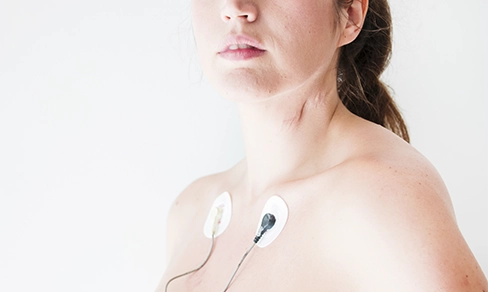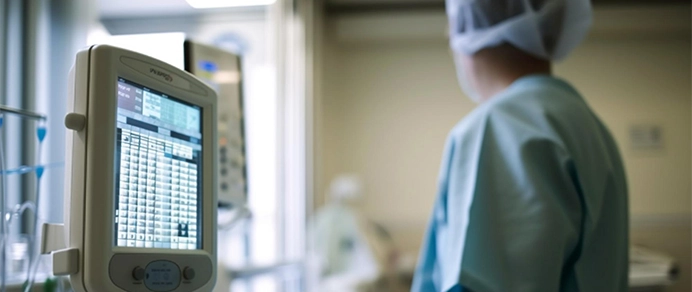— Procedures
Electrocardiogram (ECG)
An Electrocardiogram, commonly abbreviated to ECG, is a test that monitors electrical impulses to check the rhythm and rate of your heartbeat or pulse.
Electrocardiogram Explained
An Electrocardiogram, commonly abbreviated to ECG, is a test that monitors electrical impulses to check the rhythm and rate of your heartbeat or pulse.


What is an ECG?
An Electrocardiogram is a simple test that records the electrical activity of your heart. The results of the test can help us to determine whether there may be any problems with your heart rate and rhythm. Obtaining an ECG is non-invasive and completely painless; they can take as little as five minutes to complete.
Why would I need one?
An ECG is an important diagnostic tool for many different heart issues. For instance, your GP or consultant might ask you to have one if you’re experiencing certain symptoms, such as:
- Chest pain
- Palpitations
- Shortness of breath
- Dizziness
Alongside other tests, ECGs can also help us to detect – or rule out – certain underlying heart conditions. These might include things like:
- Rhythm problems – when the heart beats too quickly, too slowly, or irregularly
- Cardiomyopathy – when the walls of the heart are too thick or thin
- Coronary heart disease – when arteries in the heart become narrowed or blocked
- Heart valve problems – when one or more of the valves in your heart stops working properly
- Heart attack (Myocardial infarction) – to determine if you may have suffered a heart attack in the past
We may also use an ECG to monitor your heart’s electrical activity while you’re having a procedure or operation, such as electrical cardioversion, or while you’re recovering afterwards.
How does the test work?
The most common type of ECG is a resting test, ie: one that’s performed while you’re lying still. It’s done by attaching a series of electrodes to your chest, wrists and ankles. The electrodes are just small sticky patches that stay gently attached to your skin. When you come into the clinic for your ECG, the nurse or cardiac physiologist will ask you to remove your upper clothing and lie back on a couch. They will then position the electrodes on your body, before connecting each patch to a wire – these wires lead back to a machine that records the electrical activity in your heart. You then simply relax while the cardiographer carries out the test (it’s important to stay as still as possible, so the machine can get an accurate recording). The test usually takes around five minutes to complete. Afterwards, you may be given a printout of your results to take to your doctor.
Are there other kinds of ECG?
Yes. Alongside resting ECGs (see ‘How does the test work?’, above), there are two other main types of ECG test:
Exercise ECG – this type of test, also known as a stress ECG, is performed while you carry out physical activity. We will usually get you to do this on a treadmill or exercise bike. After attaching the sticky electrodes to your skin, the physiologist will ask you to start walking or turning the pedals – slowly at first, then quickening the pace so your heart rhythm increases. They will then carefully monitor your heart’s electrical activity as you exercise. Exercise ECGs are often used to detect whether you have coronary heart disease, or if you’ve been having symptoms of angina. They usually take from three to 15 minutes to complete.
Ambulatory ECG – this longer test, also known as a Holter monitor test, happens at home rather than in the clinic. We use it if we want to find out more about how your heart performs over an extended period, which might be from 24 hours up to seven days. As with a regular ECG, we begin the test by attaching a series of sticky electrodes to your chest (this part is done in the clinic). The electrodes are then attached to a portable device called a Holter monitor, which you take away with you. You’ll be asked to go about your day as you normally would. We may ask you to keep a diary of your symptoms as well. The device usually sits in a small slip by your waist. It’s waterproof, so you can take showers, but it’s best to avoid swimming or bathing. Once you’ve completed the test period, we will analyse the results and go through them with you.
How should I prepare for my ECG?
ECGs are simple and non-invasive, so you won’t need to do much to prepare beforehand. We ask that you don’t apply any lotions, oils or powder to your chest area before you come in, and that you wear loose clothing – a shirt or blouse with buttons down the front is ideal. If you’re having an exercise ECG, a pair of comfortable walking shoes or trainers is preferable; it’s also a good idea to avoid eating a heavy meal beforehand.
Patient’s thoughts

Jonathan’s Expertise
Common Questions
Book a Consultation
Reach out and book a consultation with Jonathan.
Expert TREATment
Heart Conditions
Experience expert treatment for heart conditions, with personalised care and advanced technology with Jonathan Lyne Heart Rhythm Cardiologist.
Extra heartbeats, usually harmless, occasionally need further investigation for caution.